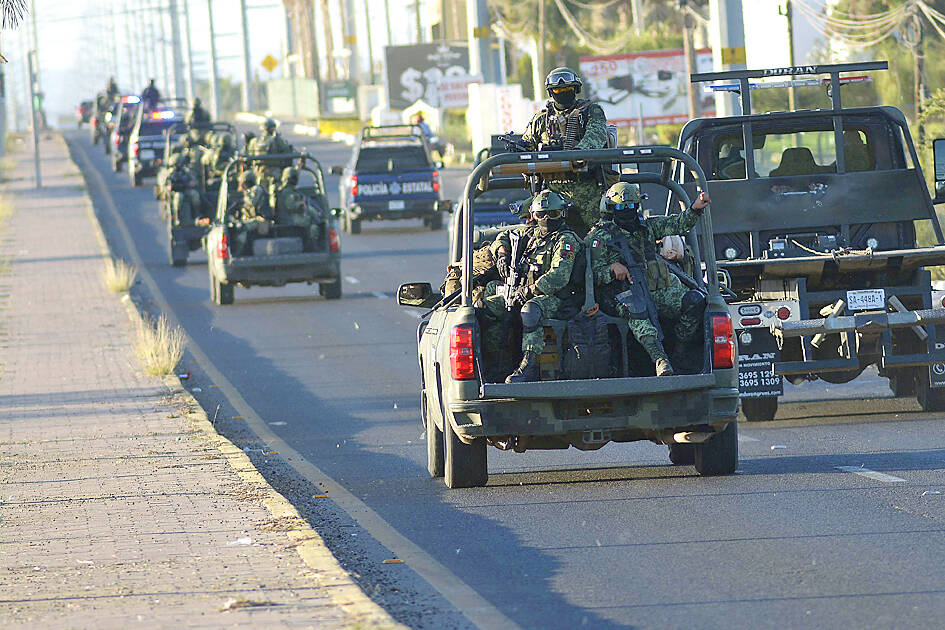The operation to detain Ovidio Guzman, the son of imprisoned drug lord Joaquin “El Chapo” Guzman, unleashed firefights that turned the northern city of Culiacan into a war zone with 30 dead, authorities said on Friday.
In a blow-by-blow description of the battles on Thursday that killed 10 military personnel and 19 suspected members of the Sinaloa drug cartel, Mexican Secretary of National Defense Luis Cresencio Sandoval said cartel members opened fire on troops with a half-dozen .50 caliber machine guns.
The army responded by calling in Blackhawk helicopter gunships to attack a convoy of 25 cartel vehicles, including truck-mounted cartel gun platforms.

Photo: AFP
The running shootouts also killed one Culiacan policeman, while 17 police officers and 35 military personnel were wounded.
The cartel then opened fire on the military aircraft, forcing two of them down with “a significant number of impacts” in each of the two aircraft, Sandoval said.
The gang then sent hordes of armed members to attack fixed-wing aircraft, military and civilian, at the city’s international airport. One civilian airliner was hit. They also shot up airport buildings in a bid to prevent authorities from flying the captured cartel boss out of the city.
However, authorities anticipating the resistance had loaded Ovidio Guzman onto a military helicopter to fly him back to Mexico City, Sandoval said.
The Mexican administration bagged the high-profile cartel figure days before hosting US President Joe Biden.
Samuel Gonzalez, who founded Mexico’s special prosecutor’s office for organized crime in the 1990s, said that Guzman’s capture was a “gift” ahead of Biden’s visit.
The Mexican government “is working to have a calm visit,” he said.
Juan Carlos Ayala, a Culiacan resident and Sinaloa University professor who studies the sociology of drug trafficking, said Ovidio Guzman had been an obvious target for years.
“Ovidio’s fate had been decided. Moreover, he was identified as the biggest trafficker of fentanyl and the most visible Chapos leader,” he said.
Ayala said the atmosphere was calmer on Friday, “but there are still a lot of burned-out vehicles blocking the streets.”
The scope of Thursday’s violence was such that Sinaloa Governor Ruben Rocha said armed cartel members showed up at hospitals, trying to abduct doctors and take them away to treat wounded fighters.
“It got to the point that at one moment the doctors were saying: ‘We’re getting out of here,’” Rocha said, adding that police reinforced security and convinced the doctors to stay.
Culiacan residents posted video footage on social media showing convoys of cartel members in pickup trucks and SUVs rolling down boulevards in the city on Thursday. At least one convoy included a flatbed truck with a mounted gun in the back.
Unlike a failed 2019 attempt to arrest Ovidio Guzman — the government said it had to release him to avoid further bloodshed — this time around there were fewer civilian casualties. Just one 14-year-old boy was shot, but is expected to survive.
While most people stayed in their homes on Thursday, by Friday people were starting to go back out on the streets, Culiacan Chamber of Commerce director Victor Medrano said. “There is still some fear ... but as they day goes on, there are greater number of people out.”

Four people jailed in the landmark Hong Kong national security trial of "47 democrats" accused of conspiracy to commit subversion were freed today after more than four years behind bars, the second group to be released in a month. Among those freed was long-time political and LGBTQ activist Jimmy Sham (岑子杰), who also led one of Hong Kong’s largest pro-democracy groups, the Civil Human Rights Front, which disbanded in 2021. "Let me spend some time with my family," Sham said after arriving at his home in the Kowloon district of Jordan. "I don’t know how to plan ahead because, to me, it feels

‘A THREAT’: Guyanese President Irfan Ali called on Venezuela to follow international court rulings over the region, whose border Guyana says was ratified back in 1899 Misael Zapara said he would vote in Venezuela’s first elections yesterday for the territory of Essequibo, despite living more than 100km away from the oil-rich Guyana-administered region. Both countries lay claim to Essequibo, which makes up two-thirds of Guyana’s territory and is home to 125,000 of its 800,000 citizens. Guyana has administered the region for decades. The centuries-old dispute has intensified since ExxonMobil discovered massive offshore oil deposits a decade ago, giving Guyana the largest crude oil reserves per capita in the world. Venezuela would elect a governor, eight National Assembly deputies and regional councilors in a newly created constituency for the 160,000

North Korea has detained another official over last week’s failed launch of a warship, which damaged the naval destroyer, state media reported yesterday. Pyongyang announced “a serious accident” at Wednesday last week’s launch ceremony, which crushed sections of the bottom of the new destroyer. North Korean leader Kim Jong-un called the mishap a “criminal act caused by absolute carelessness.” Ri Hyong-son, vice department director of the Munitions Industry Department of the Party Central Committee, was summoned and detained on Sunday, the Korean Central News Agency (KCNA) reported. He was “greatly responsible for the occurrence of the serious accident,” it said. Ri is the fourth person

Poland is set to hold a presidential runoff election today between two candidates offering starkly different visions for the country’s future. The winner would succeed Polish President Andrzej Duda, a conservative who is finishing his second and final term. The outcome would determine whether Poland embraces a nationalist populist trajectory or pivots more fully toward liberal, pro-European policies. An exit poll by Ipsos would be released when polls close today at 9pm local time, with a margin of error of plus or minus 2 percentage points. Final results are expected tomorrow. Whoever wins can be expected to either help or hinder the